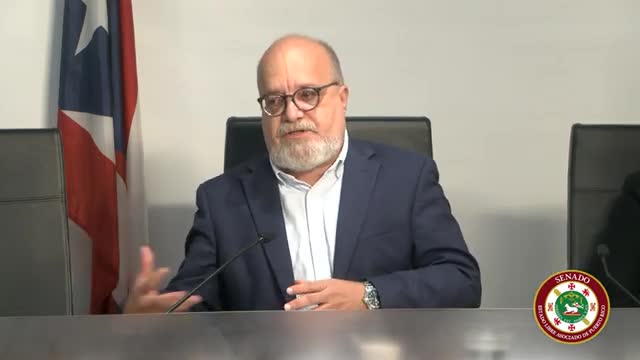Puerto Rico Senate probes medical evaluation failures in controversial inmate release case
May 29, 2024 | Senate, Committees, Legislative, Puerto Rico

This article was created by AI summarizing key points discussed. AI makes mistakes, so for full details and context, please refer to the video of the full meeting. Please report any errors so we can fix them. Report an error »

In a recent government meeting held on May 29, 2024, the Comisión de Iniciativas Comunitarias, Salud Mental y Adicción convened to address pressing issues surrounding the evaluation processes for individuals seeking extended permits due to medical conditions. The discussions revealed significant concerns regarding the consistency and thoroughness of evaluations conducted by medical professionals within the correctional system.
As the meeting unfolded, a poignant moment arose when a panel member questioned the rationale behind a recent positive recommendation for a patient who had previously been denied three times for the same condition. The individual in question, paraplegic since 2019, had undergone evaluations that consistently deemed them ineligible for an extended permit. Yet, in 2022, a different conclusion was reached without apparent changes in the patient's medical status. This inconsistency raised alarms about the evaluation process and the potential oversight of critical patient history.
The dialogue highlighted a systemic issue: the failure to adequately consider prior evaluations when making current recommendations. One panelist expressed concern that overlooking such history could lead to dangerous precedents, suggesting that a thorough review of all relevant medical records is essential for informed decision-making. The implications of these discussions extend beyond individual cases, touching on broader themes of accountability and the integrity of the healthcare system within correctional facilities.
Moreover, the meeting underscored the emotional toll on families and individuals affected by these decisions. A poignant letter from an incarcerated individual seeking employment opportunities under parole conditions illustrated the human side of these bureaucratic processes. The letter conveyed a sense of despair, reflecting the fear that systemic failures could unjustly tarnish the reputations of all individuals within the correctional system.
As the meeting concluded, it became clear that while the need for rehabilitation and fair evaluation processes is paramount, the system must also ensure that past decisions are not disregarded. The discussions served as a reminder of the delicate balance between compassion and caution in the realm of public health and safety, leaving attendees with a renewed commitment to reforming the evaluation processes to prevent future oversights.
As the meeting unfolded, a poignant moment arose when a panel member questioned the rationale behind a recent positive recommendation for a patient who had previously been denied three times for the same condition. The individual in question, paraplegic since 2019, had undergone evaluations that consistently deemed them ineligible for an extended permit. Yet, in 2022, a different conclusion was reached without apparent changes in the patient's medical status. This inconsistency raised alarms about the evaluation process and the potential oversight of critical patient history.
The dialogue highlighted a systemic issue: the failure to adequately consider prior evaluations when making current recommendations. One panelist expressed concern that overlooking such history could lead to dangerous precedents, suggesting that a thorough review of all relevant medical records is essential for informed decision-making. The implications of these discussions extend beyond individual cases, touching on broader themes of accountability and the integrity of the healthcare system within correctional facilities.
Moreover, the meeting underscored the emotional toll on families and individuals affected by these decisions. A poignant letter from an incarcerated individual seeking employment opportunities under parole conditions illustrated the human side of these bureaucratic processes. The letter conveyed a sense of despair, reflecting the fear that systemic failures could unjustly tarnish the reputations of all individuals within the correctional system.
As the meeting concluded, it became clear that while the need for rehabilitation and fair evaluation processes is paramount, the system must also ensure that past decisions are not disregarded. The discussions served as a reminder of the delicate balance between compassion and caution in the realm of public health and safety, leaving attendees with a renewed commitment to reforming the evaluation processes to prevent future oversights.
View full meeting
This article is based on a recent meeting—watch the full video and explore the complete transcript for deeper insights into the discussion.
View full meeting